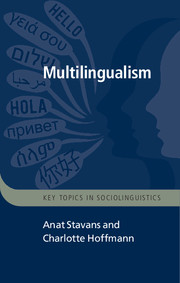Book contents
- Frontmatter
- Dedication
- Contents
- List of Figures and maps
- List of Tables
- Acknowledgements
- Introduction
- Part I Global and societal issues in multilingualism and trilingualism
- Part II Construing individual multilingualism
- 5 Individual multilingualism
- 6 Multilingual language competence and use
- 7 Accommodating multilingualism
- 8 Multilingual education and multilingual literacies
- Glossary
- References
- Author index
- Places and languages index
- Subject index
7 - Accommodating multilingualism
Published online by Cambridge University Press: 05 February 2015
- Frontmatter
- Dedication
- Contents
- List of Figures and maps
- List of Tables
- Acknowledgements
- Introduction
- Part I Global and societal issues in multilingualism and trilingualism
- Part II Construing individual multilingualism
- 5 Individual multilingualism
- 6 Multilingual language competence and use
- 7 Accommodating multilingualism
- 8 Multilingual education and multilingual literacies
- Glossary
- References
- Author index
- Places and languages index
- Subject index
Summary
The world is a mosaic of visions. With each language that disappears, a piece of that mosaic is lost.
François GrosjeanIntroduction
Multilinguals must (and do) find ways of organising the use of their languages to fulfil their communicative needs and accommodate their social, cultural, economic and psychological needs according to the context in which they find themselves. Multilinguals are guided by basically the same considerations as monolinguals, who make certain linguistic choices and adjust their speech to suit particular situations, interlocutors and topics. However, multilinguals have a broader range of choices, i.e. choice of language in addition to choice of style, register, accent, other dialect features and cultural codes. For instance, the conversation between a multilingual and monolingual will conform not only to the use of a single linguistic system, but also to the appropriate pragmatic codes of the language; and the cultural codes adhered to by that monolingual’s speech community. However, when the same multilingual engages in conversation with a bilingual, the communicative needs may change and accommodation might become more complex. In such a situation, the multilingual may speak both of the languages of the bilingual and this may lead to differential use of these languages to express different things; and at the same time, it may cause the alteration and combination of these two languages. If, on the other hand, the same multilingual shares only one of the bilingual’s languages, the interaction will resemble that of the interaction with a monolingual but will have an added value of flexibility and empathy to the non-monolingual status that both share. Hence, for the multilingual interacting with another multilingual or a monolingual, language accommodation requires that participants choose the language that is common to all; or, if all participants share the same languages, the choice of appropriate code is likely to be determined by other factors, such as communicative purpose, power, solidarity, inclusion and identity with a certain speech community or group.
- Type
- Chapter
- Information
- Multilingualism , pp. 193 - 227Publisher: Cambridge University PressPrint publication year: 2015

